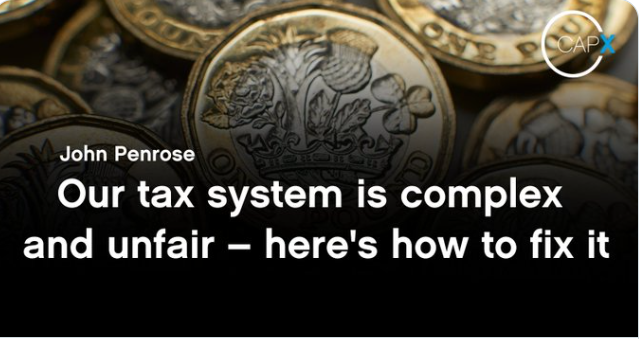This article is the latest in a fortnightly series of policy proposals for CapX from John Penrose and the Centre for Small State Conservatives.

The slow, warm days of August are traditionally when Treasury spin doctors start floating ideas for an upcoming Autumn Budget. This year’s kite-flying included replacing stamp duty with a property sales tax which, sadly, is the economic equivalent of putting lipstick on a pig. Stamp duty is already a kind of sales tax, so replacing it with a slightly different alternative is just tinkering. It won’t solve the fundamental problem, that all sales taxes create frictions which slow economies down, no matter how much you tweak them.
It’s a textbook example of a broader trend that governments of all kinds have made worse for decades. Rather than reforming or abolishing economically damaging, growth destroying levies like stamp duty, we’ve increased them instead. At the same time, we’ve cut less economically-damaging taxes by shooting them full of complicated and expensive loopholes and special schemes where small numbers of people and organisations pay lower taxes which then have to be funded by higher rates for everyone else.
The effects have been disastrous. Raising those economically damaging taxes makes Britain grow slower, and all the complicated loopholes make things worse by pushing business investment towards tax-efficient special schemes rather than into industries and firms where it could be used more productively. They reward people who focus on lobbying politicians to create more loopholes, or who fit their affairs inside ones that already exist, rather than the people who grow businesses and create jobs.
The answer to all of this complexity is simpler, lower taxation. If we close expensive and distortionary loopholes, before ploughing the proceeds back into lower overall tax rates and abolishing the most damaging levies entirely, our economy will flourish.
For businesses, lots of special tax schemes and loopholes were originally created to stimulate investment. But the last Conservative government introduced ‘full expensing’ which makes business investment fully tax deductible in the year it happens, turning all the other schemes into expensive, redundant duplicates at a stroke. Closing them and using the proceeds to cut the rates of corporation tax, employer national insurance contributions or stamp duty would be electric.
The same medicine would work wonders for income taxes too. At the moment, people pay different tax rates depending on whether their income is earned from work or unearned from investments. In general, our tax system levies lower rates on wealthy people for their unearned investment incomes than it does on less well-off workers for their wages. That’s clearly unfair because the ‘haves’ are being subsidised by the ‘have nots’. By treating earned and unearned income equally with a single, unified income tax threshold and set of percentage rates, would be fairer and mean lower personal income taxes for most people too.
The taxes we levy on assets and wealth are some of our worst. Inheritance tax and stamp duty are both so economically harmful that they are beyond redemption and can’t be reformed. But capital gains tax could be reformed to replace them both.
Step one would be to update capital gains tax to allow for inflation between when an asset was bought and then sold. Calculating the smaller, inflation-adjusted profit would be easy with modern tax apps, and would turn it into the economic equivalent of getting several years of wages in a single lump. That would make capital gains into a much less damaging levy, and mean it could and should rightly be taxed like normal income at the new unified rate, which would be simpler still. The proceeds would be ploughed back into reducing and then abolishing stamp duty entirely.
Step two would be to abolish inheritance tax and replace it with the newly-improved version of capital gains tax instead. Anyone inheriting a house they don’t live in, investments or shares in a family firm or farm, would pay no tax unless and until they sold whatever they’d been given, when capital gains tax would apply from the date their ancestor first bought it. This would be a much better system, because no one would be forced into selling anything unless it made economic sense for their personal circumstances. And it would be fairer, because children would still pay taxes on what they’d received, after allowing for inflation, at the same rate as if they’d earned it themselves, at a time when they had cash from the sale to afford it.
What we now need is a government that understands that simpler and fairer taxes are the both possible, and the best way to grow our economy,
If you like this idea, you’ll find more details, soundbites and rebuttals about it under Simpler, Lower Taxes in the Policy Thumbnail section of our website

Leave a Reply to Janiya Heidenreich Cancel reply